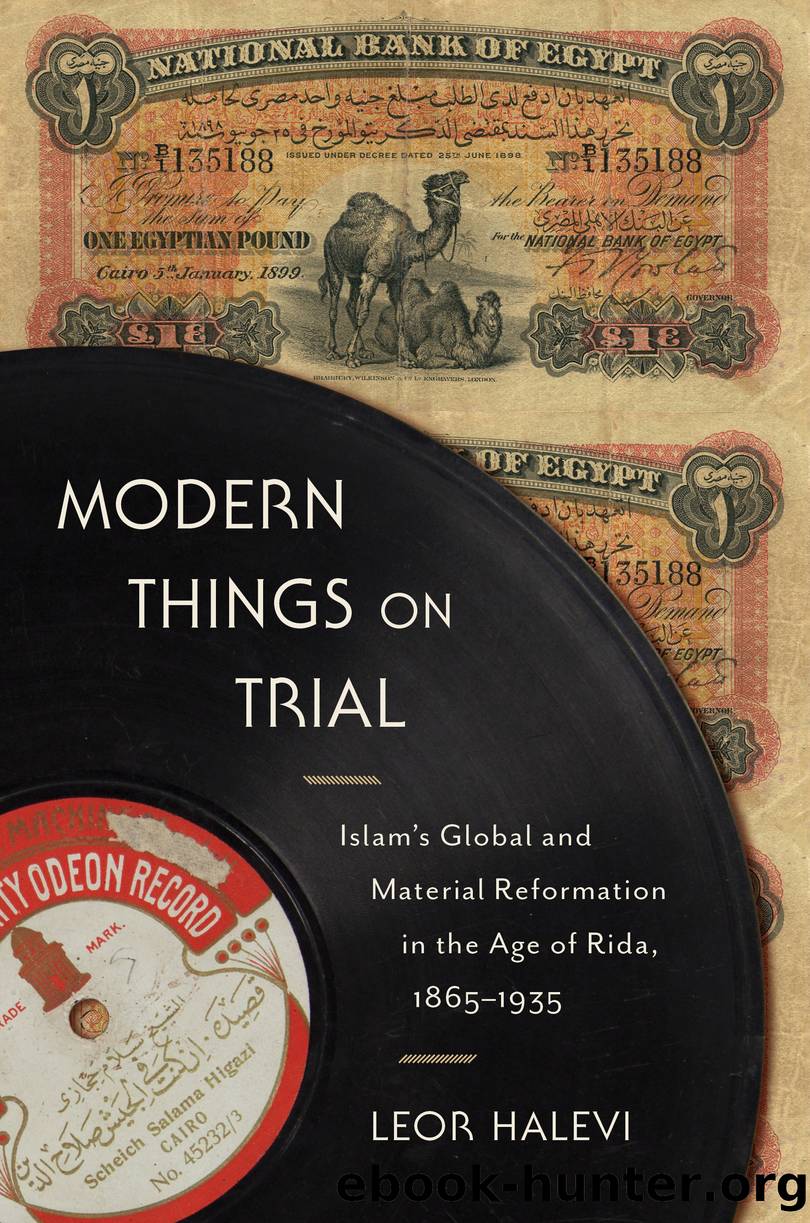Modern Things on Trial by Halevi Leor.;

Author:Halevi, Leor.;
Language: eng
Format: epub
Publisher: Lightning Source Inc. (Tier 3)
Anti-British Boycotts and Nationalist Economics in Egypt
The Egyptian campaign for independence that began with the 1919 revolution took a new turn, in 1922, toward the politics of economic resistance. Egyptian women launched a consumer boycott of British goods. Historians of this boycott have wondered if participants were familiar with the corresponding Indian model. In an era when persons and news traveled with ease from India to Egypt, they were surely aware of it. As early as 1910 a confidential British report on “Secret Societies” in Egypt mentioned that a suspended society, the Society for Life (Jamʿiyyat al-Ḥayāh), had “one or two Indians who used to plead the necessity of adopting the Indian system of fighting the occupation.” Headed by ʿUmar Bey Luṭfī, another society profiled in the same report was providing “its members with necessary provisions and domestic supplies, with the view of boycotting foreign, and especially English goods in the future.”37 Long in the making, the 1922 Egyptian boycotts were definitely informed by Indian precedents.
Spearheading this effort, a committee of leading women—representing both Muslims and Copts—joined together to take a common “religious oath,” an ecumenical vow to struggle steadfastly until victory: “We swear by God … to boycott the British aggressor, to deny to ourselves and to the people close to us everything that those usurpers have manufactured. By God, their shops are forbidden to us. By God, their factories are forbidden to us. By God, all that is connected to them is forbidden to us.”38 They protested first the continuation of the protectorate and then, after its abolition on February 28, 1922, the sham of Britain’s unilateral declaration of independence. They rallied Egyptians to stop patronizing English bankers, haberdashers, shopkeepers, pharmacists, dentists, and doctors. So long as martial law and censorship of the press continued, and so long as their colleagues remained confined to exile or jail, they pledged to maintain this form of pressure on the government.39
Widely publicized and moderately successful, their consumer movement had profound reverberations. Suddenly, it endowed economic behavior with urgent political meaning. The principles of self-abnegation and self-sufficiency, which Gandhi had cultivated, did not motivate Cairo’s boycotters to action. Cairo had no swadeshi stores. Lacking diversification, indigenous industries offered a limited selection of substitute goods. Symbolic action mattered more than economic purity. Even though they celebrated “national” industry, Cairo’s bourgeois boycotters were not opposed to the substitution of British imports with other European alternatives. To resist British imperialism by buying French or Italian—rather than English—clothes was, for them, a political virtue.40
Boycotters in Cairo mainly targeted ready-made clothes. Before, during, and after the boycotts of 1922 to 1924, textiles and apparel figured as Britain’s most valuable export to Egypt. Overall the leading import in these years, they accounted for more than a third of the total value of imported goods from all nations. Britain’s other main exports (coal, machinery, and metals) paled in significance. Between 1922 and 1924 the value of British cloth exported to Egypt declined, however, from approximately 9 million to 7.7 million Egyptian pounds.
Download
This site does not store any files on its server. We only index and link to content provided by other sites. Please contact the content providers to delete copyright contents if any and email us, we'll remove relevant links or contents immediately.
| Hadith | History |
| Law | Mecca |
| Muhammed | Quran |
| Rituals & Practice | Shi'ism |
| Sufism | Sunnism |
| Theology | Women in Islam |
The History of Jihad: From Muhammad to ISIS by Spencer Robert(2504)
Nine Parts of Desire by Geraldine Brooks(2275)
The Turkish Psychedelic Explosion by Daniel Spicer(2245)
The First Muslim The Story of Muhammad by Lesley Hazleton(2153)
The Essential Rumi by Coleman Barks(1927)
1453 by Roger Crowley(1879)
The Last Mughal by William Dalrymple(1787)
Trickster Travels: A Sixteenth-Century Muslim Between Worlds by Davis Natalie Zemon(1781)
Muhammad: His Life Based on the Earliest Sources by Martin Lings(1567)
by Christianity & Islam(1559)
God by Aslan Reza(1555)
A Concise History of Sunnis and Shi'is by John McHugo(1507)
Magic and Divination in Early Islam by Emilie Savage-Smith;(1448)
No God But God by Reza Aslan(1431)
The Flight of the Intellectuals by Berman Paul(1391)
Art of Betrayal by Gordon Corera(1359)
Nothing to Envy by Barbara Demick(1319)
What the Qur'an Meant by Garry Wills(1318)
Getting Jesus Right: How Muslims Get Jesus and Islam Wrong by James A Beverley & Craig A Evans(1271)
